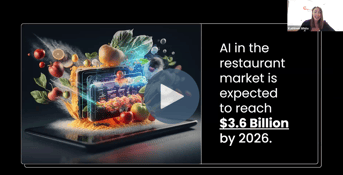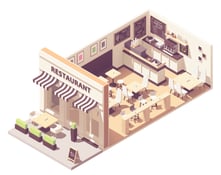D'Andre Carter’s tried just about every business model in the restaurant industry. His first job after culinary school was at Chicago’s now closed, but once Michelin-starred Moto, where he met his current business partner and wife, Heather Bublick. After four years in the fine dining world, the two stepped out on their own, starting an underground dinner club, which went on to morph into an upscale catering company, and later, a food truck operation.
“When the pandemic hit, no one was having parties or getting married, nobody wanted to go out – so we figured we’d bring the food to them,” says Carter of the decision to buy a food truck.
The food truck venture evolved into what’s now known as Soul & Smoke, a multi-concept brand behind some of Chicago’s most popular barbecue and comfort food, inspired by what Carter grew up cooking with his grandmother. Alongside the food truck, Carter and Bublick have a food hall residency in Time Out Market Chicago. During the pandemic, they also operated out of two ghost kitchen locations. And as of this year, they’ve added a walk-up eatery to their ever growing brand, along with a retail line of BBQ sauces. Carter says more product launches are also on the horizon, as well as a restaurant build out in Chicago’s Evanston neighborhood.
We sat down with Carter to chat about his experiences across various parts of the industry and what he considers the keys to Soul & Smoke’s growth and success.
During the pandemic, you pivoted to a food truck, which became quite popular. But you also launched in the ghost kitchen market, which you’ve since left. I’d love to hear more about your experience with that and your key takeaways.
So we started doing food to-go and got on the delivery platforms. We added pickup on our website, and it was all going really well. But we noticed that people outside of our three-mile radius weren't able to try our food.
The ghost kitchen idea was floating around a lot at that time, and so we signed up for one location and ended up signing up for another. We were busy on Uber Eats, DoorDash. But I just think the consumer wasn't ready, and our experience wasn’t what we expected it to be.
We thought we might get some walk-up business, and we’d still operate as a to-go business. But consumers didn’t know how to react to ghost kitchens. It didn’t end up making financial sense for us, but it did allow us to introduce our food to people outside the neighborhood, so it was a little bitter with the sweet.
Would you recommend the ghost kitchen model to other entrepreneurs?
For somebody that’s just starting out, who’s low on money – you get a lot of tech support, front of house support. It was very easy for us to staff. You could put two cooks in the kitchen. Once they put the food on the rack, the ghost kitchen operator takes over from there. They interact with the guests and the delivery drivers. And that’s a benefit to any small business to have that type of support. But it just wasn’t for us.
Between the ghost kitchens, food truck, food hall residency, and your newest eatery at Rockwell on the River, how would you say all of those experiences have come together to shape your current business model?
We look at everything as a brand opportunity. We are really pushing a brand – Soul & Smoke. The brand is going to decide whether you’ll be a long-term business or a short-term business. There's plenty of great restaurants and chefs that nobody has ever heard of. We want to get our name out so that in Chicago we become a household name. And we’re taking sacrifices in the earliest stages of the business to make sure that happens.
Yes, we want to make money to pay the bills, but we’d rather have people familiar with us. A small business needs to be recognized, so that’s been a big part of our strategy. That’s why we keep doing the food truck. We like that, and it’s branded, and we can take it to all different locations. We’re actually about to sign a lease to get another food truck.
At this point, do you feel like having multiple concepts or revenue streams is essential for a restaurant to stay afloat?
It’s very important. But you’ve got to find something that's not going to distract you from operating your restaurant. It's got to be something that corresponds to what you've already got. Otherwise, it's taking attention away from your main thing.
It also takes money to make money. A lot of small businesses have to really be grinding to open up another opportunity. We looked at taking one of our top-sellers, our barbecue sauce, to retail. We reach out to a co-packer, and they tell us it’s a 250-gallon minimum. That’s around $25 [grand] to $30 grand for any small business. But you want to make money…so it’s just different types of sacrifices that you have to make.
What do you think have been the keys to your own expansion?
Our worth ethic is deep and serious. We’re open seven days a week, operating lunch through dinner. A lot of people are open for lunch but not dinner, but they’re paying rent for the space.
I just left the barbershop and was talking to a chef, and people are getting a lot of pushback about pricing. The cost of goods is going up, and people aren’t raising their prices because they think their customers won't pay. But this is how much it costs. If a lot of restaurants stuck to true pricing, less businesses would be going out of business.
How do you handle pushback on pricing?
I get pushback all the time. We apologize and explain. Boneless, skinless chicken used to be 99 cents. It’s $3.75 right now. I used to pay $3.25 for brisket. I’m paying $6.50 for brisket right now. People have to adjust. Luckily, if someone gets mad, I have a lot of customers. But it does affect the bottom line. We just try to stick to our guns and give the best quality product as possible.
Can you share any advice for operators who are in the early stages of trying to expand their own brand?
It's going to be tough. There will be so many ups and downs, but you have to believe in yourself. You have to really know that this is what you really want to do. If you have a strong work ethic and passion about the cuisine, that's the recipe for success.





